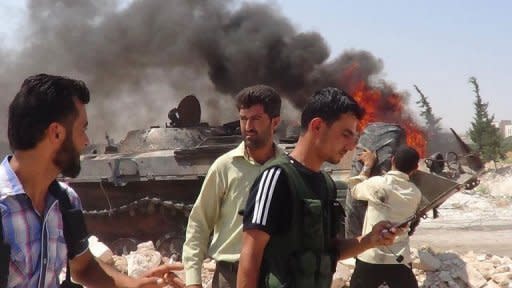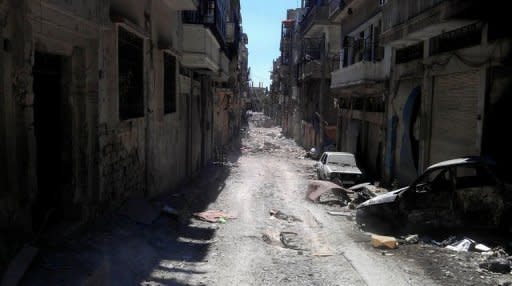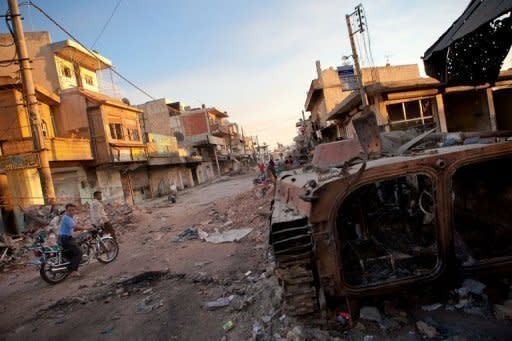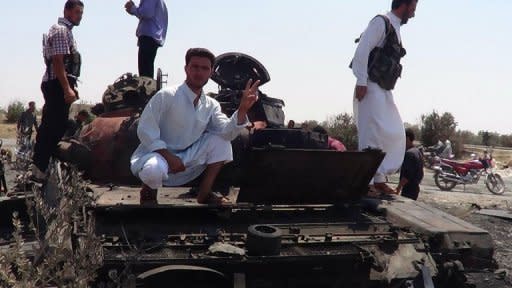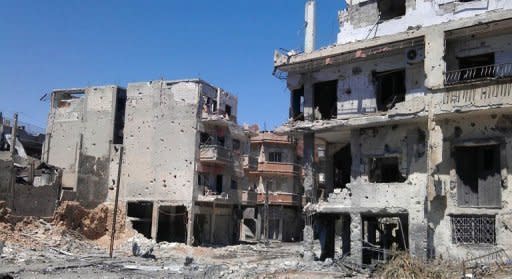China joins Russia in staying away from Syria talks
China joined Russia on Thursday in boycotting a meeting aimed at coordinating efforts to stop the bloodshed in Syria, where three senior army officers were among more than 150 people reported killed in 48 hours. Moscow confirmed that some Western countries had asked it to offer Syrian President Bashar al-Assad a haven in exile, saying it had dismissed the idea as a "joke." In Beijing, foreign ministry spokesman Liu Weimin said China would not attend the so-called "Friends of Syria" gathering in Paris on Friday. China "at present does not consider attending the meeting," Liu said. Russia has also said it will stay away from the meeting after accusing the West of seeking to distort a weekend deal by world powers in Geneva aimed at achieving a transition of power. The Paris meeting follows one in Tunis and another in Istanbul, both of which called in vain for tougher action against Assad's government. China did not attend either of those meetings, in which the United States, France, Britain, Germany and Arab nations Saudi Arabia and Qatar lead a group of more than 60 members, including most EU states and many Arab League nations. China backed Russia in Geneva on insisting that Syrians must decide how the transition should be carried out, rather than allow others to dictate their fate, and did not rule out Assad remaining in power in some form. The West has said Assad should not be part of any new unity government. Russian Foreign Minister Sergei Lavrov confirmed that Western nations had asked Moscow to offer Assad asylum and that the idea was first raised by German Chancellor Angela Merkel during June 1 talks with Russian President Vladimir Putin. "Our side thought this was a joke and responded with a joke -- how about you, the Germans, take Mr Assad instead," Lavrov said during a press appearance with his German counterpart, Guido Westerwelle. Lavrov said he was "quite surprised" when the idea was raised again during the meeting in Geneva on Saturday. The foreign minister also repeated Russia's displeasure with the slow pace of reforms pursued by its Soviet-era ally, but again argued that any attempts at forced regime change were doomed to end in even greater violence. "Yes, the regime bears the main responsibility," but those who seek regime change "ignore the fact that we are not talking about a few dozen people -- as they tell us we are -- but a very large part of the Syrian population that ties its security to the current president." On the eve of the Paris meeting, Amnesty International called for an immediate arms embargo on the Syrian government and for caution over the supply of weapons to rebels. "Amid growing reports of abuses by members of the armed opposition, states should also stop arms transfers to the opposition wherever there is a substantial risk that they are likely to be used for war crimes or other human rights abuses," it said. On the ground, the Syrian Observatory for Human Rights reported at least 56 people killed nationwide on Thursday, a day after 99 people died in the violence that has plagued the country for nearly 16 months. Syrian troops on Thursday rained shells on several regions of the northwestern province of Idlib, a hotbed of anti-regime sentiment, killing six in the town of Maaret al-Numan and at least five in Al-Tah village, it said. The Britain-based watchdog has estimated that more than 16,500 people have been killed since the Syria uprising erupted in mid-March last year. Among the dead in this week's violence were a general and two other senior officers killed by gunmen on Wednesday, the watchdog said. Meanwhile, whistle-blower Internet website WikiLeaks said on Thursday it was publishing more than two million emails from Syrian political figures dating back to 2006. WikiLeaks founder Julian Assange, currently holed up in Ecuador's embassy in London seeking political asylum, said in a statement: "The material is embarrassing to Syria, but it is also embarrassing to Syria's external opponents. "It helps us not merely to criticise one group or another, but to understand their interests, actions and thoughts. It is only through understanding this conflict that we can hope to resolve it."

